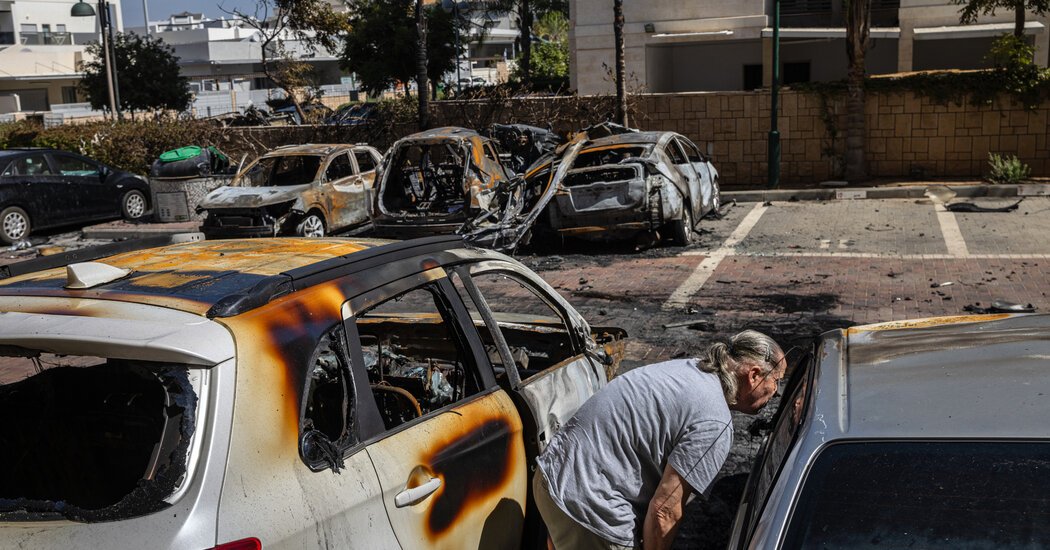[ad_1]
The United States has collected multiple pieces of intelligence that show that key Iranian leaders were surprised by the Hamas attack in Israel, information that has fueled U.S. doubts that Iran played a direct role in planning the assault, according to several American officials.
The United States, Israel and key regional allies have not found evidence that Iran directly helped plan the attack, according to the U.S. officials, an Israeli official and another official in the Middle East.
While the U.S. officials would not identify the Iranian officials who expressed surprise at the weekend’s events, they said the Iranian officials were people who typically would be aware of operations involving the Quds Force, Iran’s paramilitary arm that supports and works with proxy forces.
U.S. officials said the intelligence investigation was continuing and could turn up evidence that Iran or other states were directly involved in the Hamas operation. Senior officials said they were keeping an open mind, reviewing old intelligence reports and looking for new information.
Iran has provided large numbers of weapons and support to Hamas over many years. U.S. officials have made clear that they believe this makes Tehran broadly complicit. But that was different from direct knowledge and involvement, they said.
Morgan Muir, a senior U.S. intelligence official, told members of Congress in a briefing on Tuesday that there was no direct link between Iran and the Hamas attack, U.S. officials said. Mr. Muir provided few details but told lawmakers that U.S. agencies had intelligence contradicting assertions that Iran had helped plan the attack.
The United States and its allies regularly track and monitor meetings between Quds Force leaders and their proxies and allies, including Hamas. But officials say there is no evidence so far that those meetings were used to plan the attack in Israel. While officials concede that there could have been other secret meetings that Western intelligence did not track, for now they have found no evidence of such meetings.
The officials spoke on the condition of anonymity to discuss the intelligence. The American officials requested that The New York Times not report the means of collection to protect sources and methods.
Jake Sullivan, the national security adviser, said on Tuesday that agencies had not collected intelligence about direct Iranian involvement in the attack, which began on Saturday.
Officials said Mr. Sullivan’s remarks reflected the intelligence collected so far, which did not point to direct involvement by Iran.
“We have said since the beginning: Iran is complicit in this attack in a broad sense because they have provided the lion’s share of the funding for the military arm of Hamas,” he said. “They have provided training, they have provided capabilities.”
Mr. Sullivan said that the United States would continue to investigate Iran’s role and knowledge of the attack. U.S. officials said that intelligence agencies were reviewing previously collected material and seeking new sources of information to better understand Iran’s knowledge and actions.
Iran has spent years providing funding and military supplies to Hamas. Much of the components Hamas uses to build rockets, for example, come from Iran before being smuggled through the Sinai Peninsula and into underground tunnels leading into Gaza. Those components are then assembled into rockets and missiles in secret locations inside Gaza.
President Biden is facing fierce criticism from some members of the Republican Party, including candidates for president, who accuse the administration of being soft on Iran. The Biden administration has been trying unsuccessfully to revive a nuclear deal with Iran and recently negotiated a deal for the release of prisoners. In exchange, Iran gained access to $6 billion in restricted oil revenues for humanitarian purposes.
Former President Donald J. Trump and other Republicans tried to cast blame on Mr. Biden, saying that those funds helped to finance the assault. But that $6 billion is not U.S. taxpayer money, as Mr. Trump and others falsely stated. Nor is there evidence that the money, which officials have said is subject to Treasury Department oversight, was used to fund the incursion.
Treasury Secretary Janet L. Yellen did not rule out the possibility of freezing the $6 billion in Iranian funds if it was determined that the country was involved in the attack by Hamas. Ms. Yellen said the funds had not yet been touched.
The United States moved an aircraft carrier to the region, a step meant to deter Iran or its proxies from opening another front in the wake of the assault.
Ronen Bergman contributed reporting from Tel Aviv.
[ad_2]
